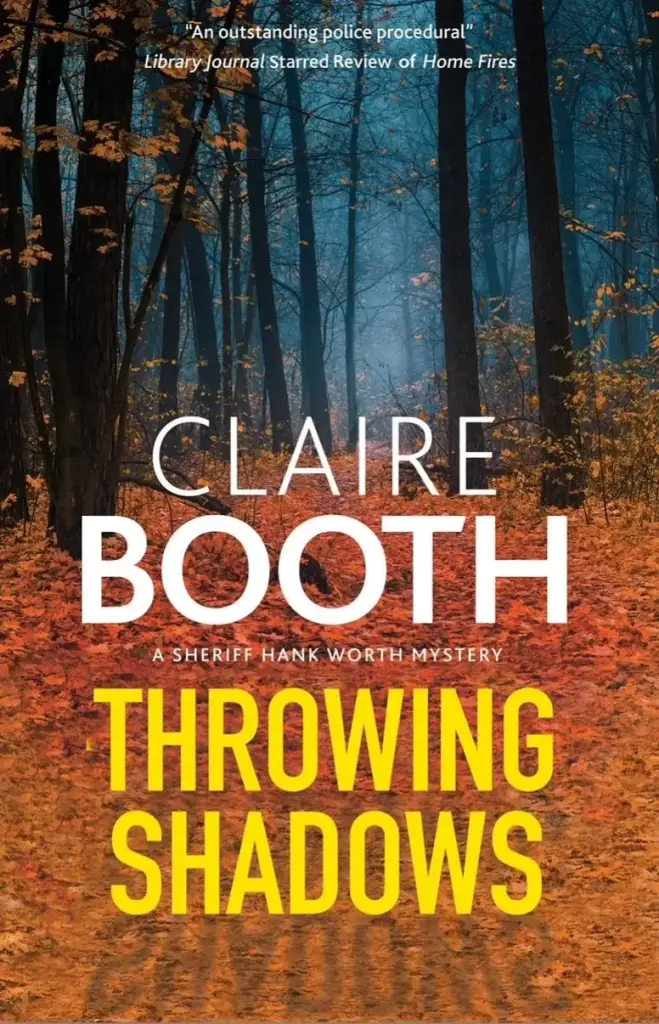Hear the Conversation | Get the Book

Every crime story begins with geography. As a reporter, Claire Booth once lived inside the cartography of violence, mapping its bloodied coordinates for readers of daily newspapers. Later, she transformed one of California’s darkest sagas into The False Prophet, her true-crime debut about a Bay Area cult leader who led his followers into extortion and murder. But after years of cataloging real suffering, she made a quiet decision: to invent her own crimes.
Now seven books deep into her Hank Worth mystery series, Claire has built a fictional territory of her own: the Ozarks, a place where scenic hills conceal long histories of violence, and where her small-town sheriff, Hank Worth, walks a tightrope between the demands of justice and the slow, relentless erosions of family life. Her latest installment, Throwing Shadows, situates Hank among the “Murder Rocks,” a real cluster of boulders south of Branson, Missouri, once notorious for Civil War-era ambushes.
Claire confessed that she never stood a chance of resisting such a place. “It’s actually called Murder Rocks,” she says, half in disbelief, half in delight. “As soon as I found out it existed, I knew I would eventually have to set a book there.” The detail arrived courtesy of a family friend, and like any good crime reporter, she filed it away until the story demanded its use.
The real history of the site is grim: guerilla fighters, “bushwhackers”, hid among the rocks, robbing and often killing travelers along the wagon trail from Arkansas north toward Springfield. One hundred and sixty years later, people still speak the names of those highwaymen, proof that old sins do indeed throw long shadows. In Claire’s hands, the rocks are relocated slightly, their ownership shifted from private land to a county forest, fictionalization serving the needs of narrative. “You shift things so they fit the story,” she explains. “Obviously you never did that in journalism. That was the hardest pivot.”
Hank Worth himself began in a kind of narrative ambush. A Kansas City detective newly arrived in Branson, he applied for a deputy job and instead found himself, by fluke and by county commission command, appointed sheriff. His discomfort in those early pages was palpable: a man trained to chase suspects suddenly marooned in mundane meetings. Over the course of the series, Claire has allowed him to grow into his title, to learn the dull but necessary skills of leadership, waging budget battles, managing a staff, while also enduring the less solvable dilemmas of family life.
In Throwing Shadows, those private struggles come to the fore. Hank’s marriage is in crisis, his relationship with his father-in-law frayed. Claire described this dual structure as a balancing act: “They were almost joint plots instead of a plot and a subplot. The murder and the family drama had to coexist, tipping the scale too far in either direction would have broken it.”
There is a quiet radicalism in Claire’s choice to burden her sheriff with toddlers. “I made them very young deliberately,” she said, “because that felt unusual in crime fiction.” Too often, detectives exist in hermetic loneliness, their work sealed off from the messy intimacies of parenting. Hank’s children, now growing, offer the series not just domestic texture but narrative weight. Crimes disrupt families, Claire seems to remind us, not just the families of victims but those of the officers who investigate.
Her creative process bears the marks of a reporter’s notebook. Ideas, overheard phrases, oddities of place are tucked away until they mature into narrative use. Murder Rocks sat in storage for years until it fit the arc she needed after the upheavals of book six. And while Claire insists she is a “pantser,” writing without outlines, she admits that her characters often seize control. A detective invented for book three reappeared, unbidden, in book five, and never left. “They just do something I was unaware I had thought of,” she said, marveling at her own subconscious.
The act of invention still feels like a renegotiation. “In journalism, you never made things up. Now I have to remind myself that I can shift reality.” Yet the shift has also brought joy. Fiction allows Claire to explore history without the blunt constraints of fact. In Throwing Shadows, the echoes of Civil War banditry braid into modern crimes and private betrayals. The result is a meditation on inheritance: how the violence of strangers and the mistakes of family alike extend their shadows forward, shaping the present.
Claire writes from the West Coast, far from her novels’ Missouri setting, but she has allies on the ground. Her husband’s family hails from Branson; her mother-in-law once served as her scout, reporting back on the texture of flowers, the smell of the air, sensations the Internet cannot convey. This fidelity to place has resonated with readers. “It’s amazing how many people have connections to Branson,” Claire says. “Relatives, timeshares, memories.” Setting becomes not just backdrop but bridge, a way for readers to encounter their own geographies in her invented crimes.
I asked why she writes. Claire pauses, then answers with the candor of someone who has tried to stop and failed. “I’m not happy if I’m not… I’m not completely me.” The shadows, it seems, belong not only to her characters, but to her as well.
Throwing Shadows is less a whodunit than a meditation on what lingers, on places where the ground is haunted by violence, and on families where private betrayals outlast apologies. Claire Booth’s gift lies in balancing those scales, refusing to let either the crime or the domestic sphere disappear. In doing so, she has made Hank Worth not just a sheriff of Branson, Missouri, but a custodian of shadows, both inherited and his own.

